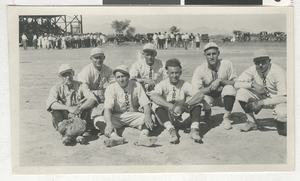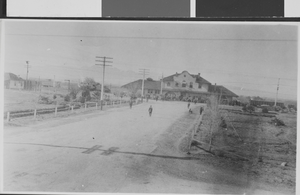Search the Special Collections and Archives Portal
Search Results
Elaine and Jim McCormick oral history interview
Identifier
Abstract
Oral history interview with Elaine and Jim McCormick conducted by Nancy Weber on March 11, 1981 for the Ralph Roske Oral History Project on Early Las Vegas. Elaine McCormick's son, Jim McCormick, was present to clarify information for his mother in the first half, then was the interview subject in the second half. Elaine McCormick discusses life as a homemaker, housewife, and owner of the Green Shack Restaurant after moving to Las Vegas, Nevada from California in 1935. Jim McCormick discusses his early life navigating Las Vegas roads, local entertainers, the weather, and Las Vegas population growth.
Archival Collection
James A. "Jimmy" Gay oral history interview
Identifier
Abstract
Oral history interview with James A. Gay III (Jimmy Gay) conducted by Perry Kaufman on April 12, 1972 for the Ralph Roske Oral History Project on Early Las Vegas. Gay discusses becoming the first African-American mortician in Las Vegas, Nevada and his work improving race relations, social, economic, and civic issues.
Archival Collection
Lee H. Lisby oral history interview
Identifier
Abstract
Oral history interview with Lee H. Lisby conducted by Glen E. Davis on July 10, 1975; Rita O'Brien on April 10, 1978; and Elizabeth Patrick on May 10, 1978 for the Ralph Roske Oral History Project on Early Las Vegas. In 1942, Lisby moved from Tallulah, Louisiana to Las Vegas, Nevada. Lisby talks about living conditions and work opportunities for African-Americans in Las Vegas.
Archival Collection
Dick Franco oral history interview
Identifier
Abstract
Oral history interview with Dick Franco conducted by Su Kim Chung on July 14, 2021 for the Boyer Early Las Vegas Oral History Project. Richard Francis or Dick Franco, his stage name by which he is more commonly known, has been juggling for over 50 years, having learned the art while he was still in high school. Taught by prominent juggling legends in Vaudeville and Las Vegas, Franco would go on to perform all over the world. He began as an opening act with the Harlem Globetrotters in the US, but he then traveled Europe and was featured in variety and production shows in Blackpool, London, Monte Carlo, and Berlin among others.
Franco won specialty awards in Monte Carlo and Paris for his juggling prowess. In the US, Franco performed extensively in Las Vegas at the shows Hallelujah Hollywood, Lido de Paris, Folies Bergere and Jubilee. He then performed many shows in Branson, MO before becoming an entertainment agent and producer in Las Vegas. His wife and daughter traveled all over the world with him and both would perform in his acts.
Archival Collection
Rossi Ralenkotter oral history interview
Identifier
Abstract
Oral history interview with Rossi Ralenkotter conducted by Claytee D. White on August 4, 2022 for the Boyer Early Las Vegas Oral History Project. In this interview, Ralenkotter describes migrating to Las Vegas, Nevada in 1951 with his parents at the age of four. He shares early memories of the city, and talks about how it brought him to be president and CEO of the Las Vegas Convention and Visitors Authority (LVCVA). Ralenkotter is responsible for marketing and branding Las Vegas and Southern Nevada as the world's most desirable destination for leisure and business travel. Under his leadership, the LVCVA launched the most successful branding campaign in tourism history, "What Happens in Vegas, Stays in Vegas." In 1971, Ralenkotter earned a master's degree in Business Administration from the University of Nevada, Las Vegas (UNLV) and in 2008 was selected as Alumni of the Year. In 2009, he was honored with UNLV's Distinguished Nevadan Award. Throughout the interview, Ralenkotter recalls his many memories of the city throughout his life, including cruising Fremont Street, swimming at Lorenzi Park, participating in Helldorado parades, and watching the transformation of sports in the city.
Archival Collection
Christopher C. Hudgins oral history interview
Identifier
Abstract
Oral history interview with Christopher C. Hudgins conducted by Claytee D. White on May 18, 2016 for the Boyer Early Las Vegas Oral History Project. Hudgins open his interview by discussing his upbringing in Virginia, his education, and the manual labor jobs he worked as a teenager. Hudgins then describes his introduction to American folk music and moving to Las Vegas, Nevada in 1976. Hudgins then recalls what the University of Nevada, Las Vegas (UNLV) was like in 1976 and how he became familiar with the city. Hudgins then discusses his career and scholarship while at UNLV as a chairman in the English department, and his interest in broadcasting. He then explains conflicts between the Board of Regents and the UNLV faculty, the expansion of UNLV related construction on Maryland Parkway, and his interest in becoming a dean. Hudgins describes his goals as dean of the liberal arts college, the challenges of implementing grants for liberal arts projects, and his views on college athletics. Lastly, Hudgins recalls attending a Nobel Prize ceremony as an invited guest of Harold Pinter, and his association with the City of Asylum organization.
Archival Collection
Ted Quirk oral history interviews
Identifier
Abstract
Oral history interviews with Ted Quirk conducted by Claytee D. White on December 15, 2017 and December 20, 2017 for the Boyer Early Las Vegas Oral History Project. In the first interview, Quirk discusses his early life in Ithaca, New York and arriving to Las Vegas, Nevada in 1973. He talks about his employment at Shell Oil, working in a chemical plant, and oil drilling. Quirk describes practicing law for patents, licensing, and contracts. He talks about his career in the housing development industry, and his involvement in the development of the Spanish Trails County Club. In the second interview, Quirk talks about Boys and Girls Club of America and being involved with the University of Nevada, Las Vegas (UNLV). He remembers forming the UNLV Golf Foundation, the Runnin’ Rebels Club, and the UNLV Research Foundation. Quirk explains the situation regarding UNLV’s Basketball Coach, Jerry Tarkanian, and the National Collegiate Athletic Association (NCAA). Lastly, Quick discusses the historical importance of the
Archival Collection

Video of interview with Adele Baratz by Adat Ari El Sisterhood, Las Vegas (Nev.), circa 2007
Date
Archival Collection
Description
Adele Baratz discusses her history, her family, moving to Las Vegas when she was young, the early Las Vegas community, and the Las Vegas Jewish community.
Moving Image

Photograph of baseball players, Las Vegas (Nev.)
Date
Archival Collection
Description
Image

Photograph of a train station, Las Vegas, circa early 1900s
Date
Archival Collection
Description
Image
